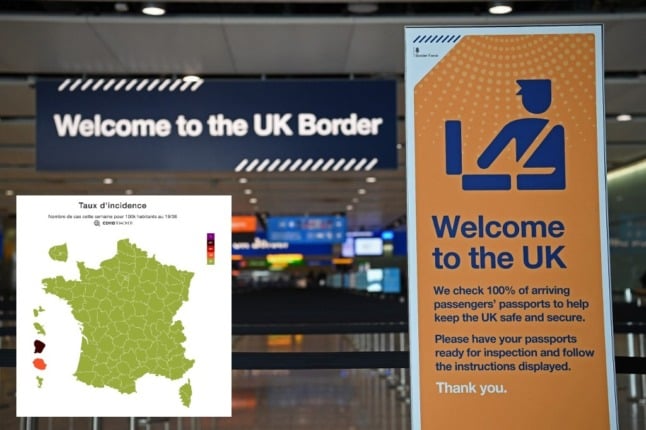Like France, the UK operates a three-tier system for travel, grading countries as red, orange and green and France and the UK are currently on each other’s orange lists.
What that means for travellers though, varies quite significantly.
In France everything depends on your vaccine status – if you’re fully vaccinated (two weeks after your second jab or four weeks after if you had the single-dose Johnson & Johnson) then you can travel to France for any reason, including tourism.
You do still need a negative Covid test (a PCR test from the previous 72 hours or an antigen test taken within 48 hours) but you don’t need to quarantine.
EXPLAINED How France’s traffic light system for travel works
If you are not vaccinated or have only had your first dose so far, then travel to France is only possible for essential reasons – find the full list of accepted reasons HERE. You will need a negative Covid test and will have to self-isolate for seven days on arrival, although the quarantine is not enforced by the authorities at this stage.
If you’re going to the UK, your vaccine status is irrelevant.
All travellers from orange list countries such as France must present a negative Covid test on arrival (PCR test or antigen test) and must then pay for one of the compulsory travel testing kits to use while there – these are expensive, costing from around £160 up to £300 depending on the provider.
Travellers also have to quarantine for 10 days on arrival, although this can be done at home or with family or friends. There is an option to pay an extra £150 to end the quarantine on day 5, after a negative Covid test.
France’s travel list is reviewed every three weeks, although as case numbers in the UK are rising it is unlikely that the country will quickly join all EU countries, Australia, Israel, New Zealand, South Korea, Japan, Singapore, Lebanon, the USA and Canada on the green list.
In the UK, there is a possibility of two things happening to make travel from France easier – either a system to recognise fully vaccinated travellers or the moving of France to the UK’s green list.
Green list
Arrivals into the UK from green list countries do not have to quarantine, although they still need to present a Covid test at the border and pay for a travel test pack once in the UK.
The UK government says the formula for calculating which countries go on the green list is based on case numbers and vaccination rates and at present the list of green countries is short and includes some pretty obscure destinations (no offence, Tristan da Cunha). Among European countries, only Iceland is on the green list after Portugal was removed.
In terms of case numbers, France is now reporting fewer daily cases than the UK while showing a steady decline in case numbers and hospitalisations.
Every part of mainland France is now under the alert level of 50 cases per 100,000 people with a national incidence level of 25.2 and an R rate of 0.58, meaning case numbers are halving week on week.
L’ensemble de la France métropolitaine est désormais en-dessous du seuil d’alerte (50 cas par semaine pour 100k habitants) pic.twitter.com/xYMhNJhUc3
— GRZ (@GuillaumeRozier) June 19, 2021
In the UK, cases are climbing again and are approaching the level of 10,000 new cases per day, while France is showing a weekly average of 2,200 cases a day.
Le nombre de cas recensés chaque jour (en moyenne) au Royaume-Uni se rapproche de la barre symbolique des 10 000. #Covid19
1/2 pic.twitter.com/mp0sdODqKN— Nicolas Berrod (@nicolasberrod) June 21, 2021
The below chart from French health journalist Nicolas Berrod shows how, 13 days after cases in the UK overtook those in France, the daily rate in the UK is now nearly five times higher than in France.
Treize jours après le croisement des courbes, le nombre de cas quotidiens au Royaume-Uni est désormais quasiment cinq fois plus élevé que celui en France. #Covid19 pic.twitter.com/gjm7AnZ0c1
— Nicolas Berrod (@nicolasberrod) June 23, 2021
Looking at vaccines, the UK is still significantly ahead of France after it got off to a much quicker start – the UK now has 43 million people with at least one dose, compared to France’s 32 million, while 31 million are fully vaccinated compared to France’s 18 million.
Vaccinated travellers
The other thing that could help at least some travellers is recognition of vaccinated status by the UK. From July 1st, the EU vaccine passport will mean those fully vaccinated in France can travel freely around the EU and Schengen zone by using their vaccine passport.
No longer a member of the EU, however, the UK will not benefit from this.
However there are signs that the UK government is considering recognising the vaccination status of travellers, with British health secretary Matt Hancock telling journalists that they are “working on it”.
At this stage, there is no detail to the plan however, and when asked if the system would be in place by the beginning of August, he told Sky News: “We’ll get there when it’s safe to do so.”
There is also some doubt as to who this would apply to, with Hancock speaking about British travellers returning from foreign travel, so it is not clear whether the British will only recognise the vaccine status of people jabbed in the UK, or whether vaccine certificates from other countries will also be recognised.
We will update our Travelling to France section as soon as there are any changes.



 Please whitelist us to continue reading.
Please whitelist us to continue reading.
Of course it’s unclear what the rules for entering the UK will be due to a government that makes it up as it goes along. The credibility of anything Hancock says must be seriously questionable when even the PM thinks he’s “totally ******* hopeless”.